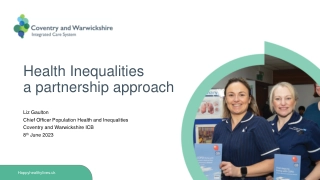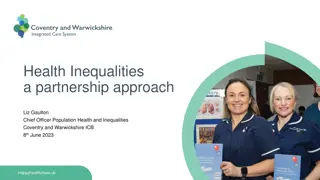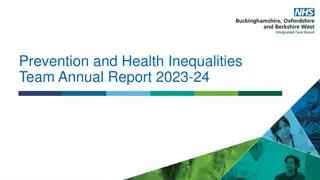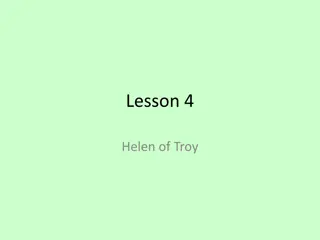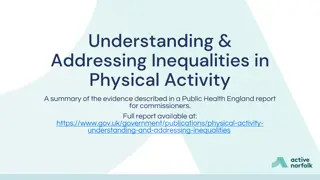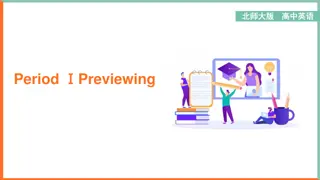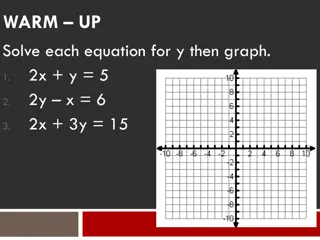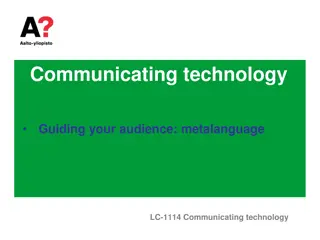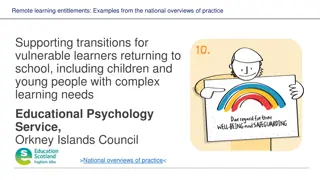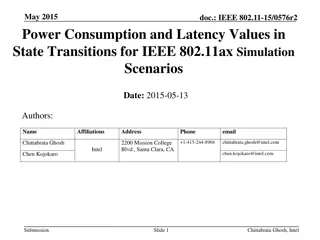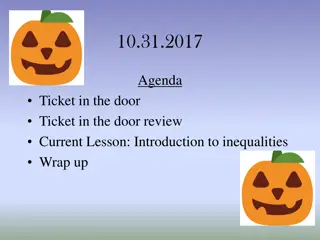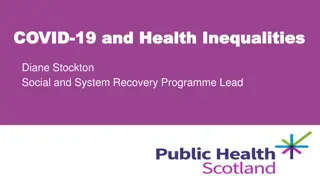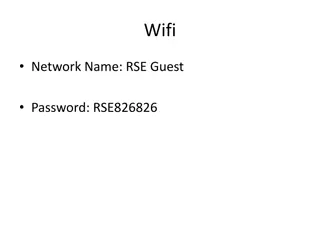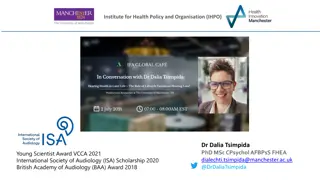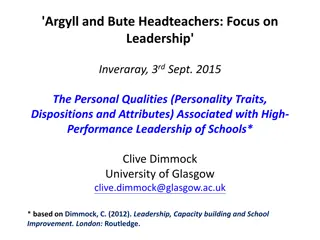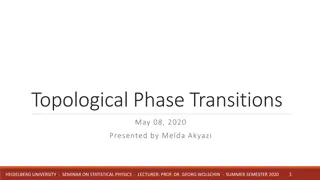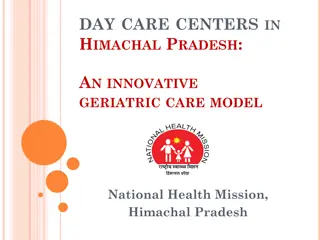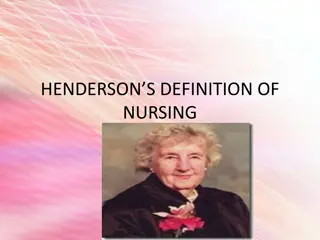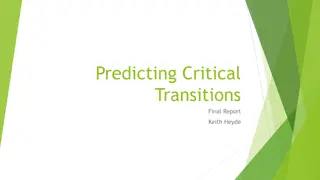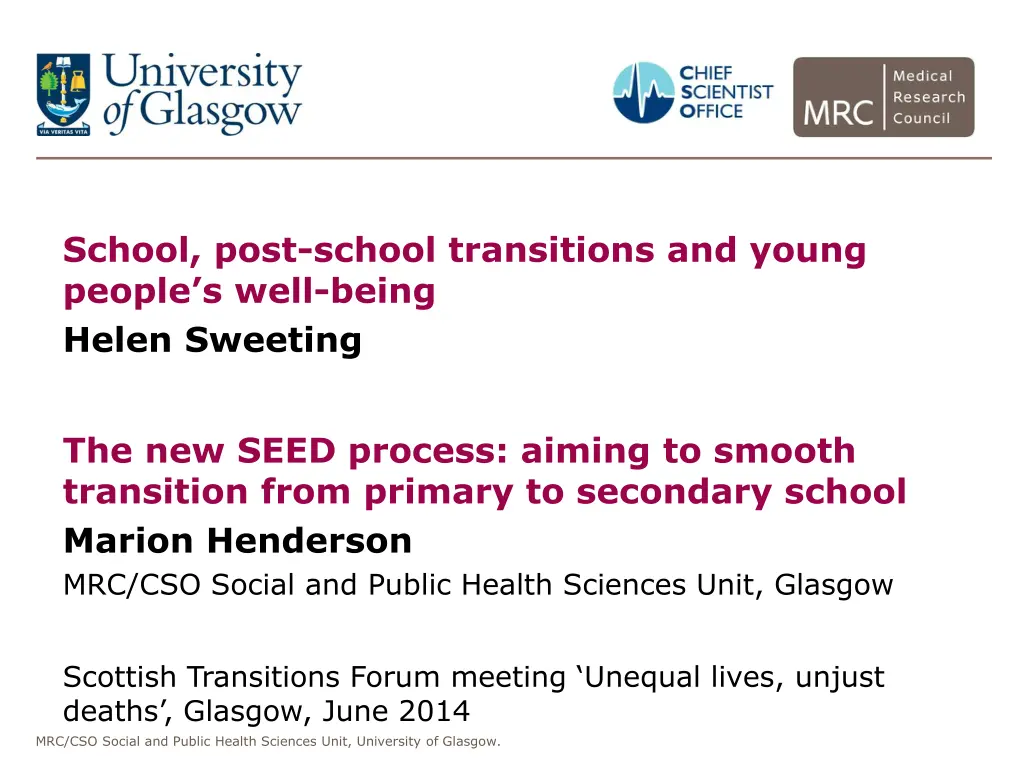
Transitioning to Secondary School: Enhancing Well-being and Success
Explore the significance of smooth primary to secondary school transitions on young people's well-being and success. Dive into the new SEED process that aims to facilitate this transition effectively. Uncover insights from the Scottish Transitions Forum meeting on providing equitable opportunities for all students. Conducted by the MRC/CSO Social and Public Health Sciences Unit at the University of Glasgow.
Download Presentation

Please find below an Image/Link to download the presentation.
The content on the website is provided AS IS for your information and personal use only. It may not be sold, licensed, or shared on other websites without obtaining consent from the author. If you encounter any issues during the download, it is possible that the publisher has removed the file from their server.
You are allowed to download the files provided on this website for personal or commercial use, subject to the condition that they are used lawfully. All files are the property of their respective owners.
The content on the website is provided AS IS for your information and personal use only. It may not be sold, licensed, or shared on other websites without obtaining consent from the author.
E N D
Presentation Transcript
School, post-school transitions and young people s well-being Helen Sweeting The new SEED process: aiming to smooth transition from primary to secondary school Marion Henderson MRC/CSO Social and Public Health Sciences Unit, Glasgow Scottish Transitions Forum meeting Unequal lives, unjust deaths , Glasgow, June 2014 MRC/CSO Social and Public Health Sciences Unit, University of Glasgow.
School, post-school transitions and young people s well-being Helen Sweeting MRC/CSO Social and Public Health Sciences Unit, University of Glasgow.
Primary Secondary MRC/CSO Social and Public Health Sciences Unit, University of Glasgow.
Primary Secondary Surveyed P7 S2 S4 19 MRC/CSO Social and Public Health Sciences Unit, University of Glasgow.
Primary Secondary Surveyed P7 Measures S2 Recalled transition S4 Well-being & achievement 19 Pupil characteristics Well-being & achievement School characteristics Pupil characteristics School characteristics MRC/CSO Social and Public Health Sciences Unit, University of Glasgow.
Primary Secondary Surveyed P7 Measures S2 Recalled transition S4 Well-being & achievement 19 Pupil characteristics Well-being & achievement School characteristics Pupil characteristics School characteristics MRC/CSO Social and Public Health Sciences Unit, University of Glasgow.
Primary Secondary Surveyed P7 Measures S2 Recalled transition S4 Well-being & achievement 19 Pupil characteristics Well-being & achievement School characteristics Pupil characteristics School characteristics MRC/CSO Social and Public Health Sciences Unit, University of Glasgow.
Primary Secondary Surveyed P7 Measures S2 Recalled transition S4 Well-being & achievement 19 Pupil characteristics Well-being & achievement School characteristics Pupil characteristics School characteristics MRC/CSO Social and Public Health Sciences Unit, University of Glasgow.
Primary Secondary Surveyed P7 Measures S2 Recalled transition S4 Well-being & achievement 19 Pupil characteristics Well-being & achievement School characteristics Pupil characteristics School characteristics MRC/CSO Social and Public Health Sciences Unit, University of Glasgow.
Primary Secondary Surveyed P7 Measures S2 Recalled transition S4 Well-being & achievement 19 Pupil characteristics Well-being & achievement School characteristics Pupil characteristics School characteristics MRC/CSO Social and Public Health Sciences Unit, University of Glasgow.
Recalled transition concerns two types School concerns Peer concerns school size older kids timetable bullying work volume mixing different teachers new friends MRC/CSO Social and Public Health Sciences Unit, University of Glasgow.
Recalled transition concerns two types School concerns Peer concerns school size older kids timetable bullying work volume mixing different teachers new friends MRC/CSO Social and Public Health Sciences Unit, University of Glasgow.
Recalled transition concerns two types School concerns Peer concerns school size older kids timetable bullying work volume mixing different teachers new friends MRC/CSO Social and Public Health Sciences Unit, University of Glasgow.
Correlates of recalled transition concerns School concerns Peer concerns Higher social class P7 poor maths ability P7 low self-esteem P7 high anxiety P7 low self-esteem P7 low aggression P7 victimised P7 less engaged from school S2 class less engaged S2 unprepared for secondary S2 fewer pals at secondary S2 more primaries S2 class less engaged MRC/CSO Social and Public Health Sciences Unit, University of Glasgow.
Correlates of recalled transition concerns School concerns Peer concerns Higher social class P7 poor maths ability P7 low self-esteem P7 high anxiety P7 low self-esteem P7 low aggression P7 victimised P7 less engaged from school S2 class less engaged S2 unprepared for secondary S2 fewer pals at secondary S2 more primaries S2 class less engaged MRC/CSO Social and Public Health Sciences Unit, University of Glasgow.
Correlates of recalled transition concerns School concerns Peer concerns Higher social class P7 poor maths ability P7 low self-esteem P7 high anxiety P7 low self-esteem P7 low aggression P7 victimised P7 less engaged from school S2 class less engaged S2 unprepared for secondary S2 fewer pals at secondary S2 more primaries S2 class less engaged MRC/CSO Social and Public Health Sciences Unit, University of Glasgow.
Correlates of S4 well-being and achievement Psychological distress Worse school transition Worse peer transition Antisocial behaviour Standard grades Better school transition Better peer transition Female High parental control Low parental care Previous distress Male Low parental care Previous ASB Female Higher social class P7 better maths ability P7 lower aggression P7 aggression P7 - victimisation P7 - disengaged from school S2 more pals at secondary S2 more primaries S2 disengaged from school S2 not disengaged from school S2 pupils rated school ethos better S2 disengaged from school MRC/CSO Social and Public Health Sciences Unit, University of Glasgow.
Correlates of S4 well-being and achievement Psychological distress Worse school transition Worse peer transition Antisocial behaviour Standard grades Better school transition Better peer transition Female High parental control Low parental care Previous distress Male Low parental care Previous ASB Female Higher social class P7 better maths ability P7 lower aggression P7 aggression P7 - victimisation P7 - disengaged from school S2 more pals at secondary S2 more primaries S2 disengaged from school S2 not disengaged from school S2 pupils rated school ethos better S2 disengaged from school MRC/CSO Social and Public Health Sciences Unit, University of Glasgow.
Correlates of S4 well-being and achievement Psychological distress Worse school transition Worse peer transition Antisocial behaviour Standard grades Better school transition Better peer transition Female High parental control Low parental care Previous distress Male Low parental care Previous ASB Female Higher social class P7 better maths ability P7 lower aggression P7 aggression P7 - victimisation P7 - disengaged from school S2 more pals at secondary S2 more primaries S2 disengaged from school S2 not disengaged from school S2 pupils rated school ethos better S2 disengaged from school MRC/CSO Social and Public Health Sciences Unit, University of Glasgow.
Correlates of S4 well-being and achievement Psychological distress Worse school transition Worse peer transition Antisocial behaviour Standard grades Better school transition Better peer transition Female High parental control Low parental care Previous distress Male Low parental care Previous ASB Female Higher social class P7 better maths ability P7 lower aggression P7 aggression P7 - victimisation P7 - disengaged from school S2 more pals at secondary S2 more primaries S2 disengaged from school S2 not disengaged from school S2 pupils rated school ethos better S2 disengaged from school MRC/CSO Social and Public Health Sciences Unit, University of Glasgow.
Correlates of S4 well-being and achievement Psychological distress Worse school transition Worse peer transition Antisocial behaviour Standard grades Better school transition Better peer transition Female High parental control Low parental care Previous distress Male Low parental care Previous ASB Female Higher social class P7 better maths ability P7 lower aggression P7 aggression P7 - victimisation P7 - disengaged from school S2 more pals at secondary S2 more primaries S2 disengaged from school S2 not disengaged from school S2 pupils rated school ethos better S2 disengaged from school MRC/CSO Social and Public Health Sciences Unit, University of Glasgow.
Correlates of S4 well-being and achievement Psychological distress Worse school transition Worse peer transition Antisocial behaviour Standard grades Better school transition Better peer transition Female High parental control Low parental care Previous distress Male Low parental care Previous ASB Female Higher social class P7 better maths ability P7 lower aggression P7 aggression P7 - victimisation P7 - disengaged from school S2 more pals at secondary S2 more primaries S2 disengaged from school S2 not disengaged from school S2 pupils rated school ethos better S2 disengaged from school MRC/CSO Social and Public Health Sciences Unit, University of Glasgow.
Correlates of post-school (age 19) well- being and achievement Psychological distress Highers Better school transition Worse peer transition Female Lone parent family Low parental care Previous distress Female Higher social class Two parent family P7 better maths ability P7 lower aggression P7 victimisation S2 researchers rated school ethos poor S2 not disengaged from school S2 pupils rates school ethos better MRC/CSO Social and Public Health Sciences Unit, University of Glasgow.
Conclusions Primary-secondary transition matters! Vulnerabilities (health/behaviour/ability) = worse transition (esp peer transition) Worse school transition = more distress, lower achievement. Worse peer transition = more distress, lower anti-social behaviour. MRC/CSO Social and Public Health Sciences Unit, University of Glasgow.
But what about post-school transitions? Health at school and post-school transitions How transitions impact on health MRC/CSO Social and Public Health Sciences Unit, University of Glasgow.
Odds of poor health in S4 according to labour market position at 19 Psychological distress Poor self-rated health Education (HE/FE) 1.00 1.00 Training 0.85 1.85 * Work 1.03 1.79 *** Unemployed/ at home 1.04 2.35 *** Odds AFTER ACCOUNTING FOR gender, parental social class and area deprivation MRC/CSO Social and Public Health Sciences Unit, University of Glasgow.
Odds of poor health in S4 according to labour market position at 19 Psychological distress Poor self-rated health Education (HE/FE) 1.00 1.00 Training 0.85 1.85 * Work 1.03 1.79 *** Unemployed/ at home 1.04 2.35 *** Odds AFTER ACCOUNTING FOR gender, parental social class and area deprivation MRC/CSO Social and Public Health Sciences Unit, University of Glasgow.
Odds of poor health in S4 according to labour market position at 19 Psychological distress Poor self-rated health Education (HE/FE) 1.00 1.00 Training 0.85 1.85 * Work 1.03 1.79 *** Unemployed/ at home 1.04 2.35 *** Odds AFTER ACCOUNTING FOR gender, parental social class and area deprivation MRC/CSO Social and Public Health Sciences Unit, University of Glasgow.
Odds of poor health in S4 according to labour market position at 19 Psychological distress Poor self-rated health Education (HE/FE) 1.00 1.00 Training 0.85 1.85 * Work 1.03 1.79 *** Unemployed/ at home 1.04 2.35 *** Odds AFTER ACCOUNTING FOR gender, parental social class and area deprivation MRC/CSO Social and Public Health Sciences Unit, University of Glasgow.
Odds of CHANGE TO poor health according to labour market position at 19 Increasing psychological distress Worsening self-rated health Education (HE/FE) 1.00 1.00 Training 0.76 1.80 * Work 0.87 1.33 * Unemployed/ at home 1.74 * 3.03 *** Odds AFTER ACCOUNTING FOR gender, previous poor health MRC/CSO Social and Public Health Sciences Unit, University of Glasgow.
Odds of CHANGE TO poor health according to labour market position at 19 Increasing psychological distress Worsening self-rated health Education (HE/FE) 1.00 1.00 Training 0.76 1.80 * Work 0.87 1.33 * Unemployed/ at home 1.74 * 3.03 *** Odds AFTER ACCOUNTING FOR gender, previous poor health MRC/CSO Social and Public Health Sciences Unit, University of Glasgow.
Odds of CHANGE TO poor health according to labour market position at 19 Increasing psychological distress Worsening self-rated health Education (HE/FE) 1.00 1.00 Training 0.76 1.80 * Work 0.87 1.33 * Unemployed/ at home 1.74 * 3.03 *** Odds AFTER ACCOUNTING FOR gender, previous poor health MRC/CSO Social and Public Health Sciences Unit, University of Glasgow.
Odds of CHANGE TO poor health at age 19 according to worries about unemployment Increasing psychological distress Worsening self-rated health Worry about unemployment .... Not at all 1.00 1.00 A bit 1.34 1.16 A lot 2.31*** 1.40* Analysis limited to those NOT currently unemployed MRC/CSO Social and Public Health Sciences Unit, University of Glasgow.
Odds of CHANGE TO poor health at age 19 according to worries about unemployment Increasing psychological distress Worsening self-rated health Worry about unemployment .... Not at all 1.00 1.00 A bit 1.34 1.16 A lot 2.31*** 1.40* Analysis limited to those NOT currently unemployed MRC/CSO Social and Public Health Sciences Unit, University of Glasgow.
Odds of CHANGE TO poor health at age 19 according to worries about unemployment Increasing psychological distress Worsening self-rated health Worry about unemployment .... Not at all 1.00 1.00 A bit 1.34 1.16 A lot 2.31*** 1.40* Analysis limited to those NOT currently unemployed MRC/CSO Social and Public Health Sciences Unit, University of Glasgow.
Summary Post-school transition (especially to un/non-employment) also matters! Poor self-rated health at school associated with future unemployment. Post-school unemployment associated with increases in distress and poor self-rated health (as are training/work, but less so). Worrying about unemployment associated with poor health ... may be causal. MRC/CSO Social and Public Health Sciences Unit, University of Glasgow.
The new SEED process: aiming to smooth transition from primary to secondary school Marion Henderson Sarah Tweedie MRC/CSO Social and Public Health Sciences Unit 24th June 2014 MRC/CSO Social and Public Health Sciences Unit, University of Glasgow.
The SEED Trial MRC/CSO SPHSU, University of Glasgow Research Team Dr Marion Henderson: Chief Investigator, SEED Prof Danny Wight: Children Young People Family and Health (CYPFAH) Programme Leader/Co-investigator Sarah Tweedie: Investigator Scientist/Project Manager, SEED Susie Smillie: Research Assistant, SEED Co-applicants: Dr Caroline Jackson (University of Queensland), Prof Lyndal Bond (CEIPS), Prof Phil Wilson (University of Aberdeen), Prof Lawrie Elliot (Edinburgh Napier University), Kate Levin (University of St Andrews), Prof Sally Haw (University of Stirling), Dr Alex McConnachie (University of Glasgow), Dr Elisabeth Fenwick (University of Glasgow) MRC/CSO Social and Public Health Sciences Unit, University of Glasgow.
What is SEED? Social and Emotional Education and Development An evidence based process rather than a prescriptive programme SEED aims to help primary schools to: a) identify the social and emotional needs of their pupils and staff, and b) select the best ways for their school to meet those needs Aligned with primary schools responsibilities for Health and Wellbeing under Curriculum for Excellence MRC/CSO Social and Public Health Sciences Unit, University of Glasgow.
The SEED Intervention Process MRC/CSO Social and Public Health Sciences Unit, University of Glasgow.
Evaluation of SEED SEED is being evaluated using a stratified, cluster randomised design (balanced by size, deprivation, denomination and clustered by associated secondary school) Funded by NIHR and supported by Robertson Centre for Biostatistics and the Scottish Mental Health Research Network 38 Primary Schools recruited across 3 Local Authorities Baseline (2013) and follow up waves of data collection in 2015, 2016 and 2017 following older cohort of pupils over transition to Secondary school Primary outcome measure is the Strengths and Difficulties Questionnaire (SDQ) Intervention group will receive SEED throughout the life of the trial, the control group will receive all their feedback in 2017 MRC/CSO Social and Public Health Sciences Unit, University of Glasgow.
Data Collection: Questionnaires Teachers of pupils in P1 and P5 complete SDQs about the pupils P5 Pupils self-complete a questionnaire (that includes SDQ) Parents of P1 and P5 cohort pupils complete questionnaires (including SDQ about their child) All school staff complete a questionnaire MRC/CSO Social and Public Health Sciences Unit, University of Glasgow.
Data Collection: Progress The Fieldwork team visited 38 schools in Dundee, Falkirk and South Lanarkshire between mid-January and the end of March Prepared and sent: o Recruitment Letters and follow up info packs to 91 schools o 2799 Letters to parents o 8081 Qs to Staff, teachers and parents Collected: o 1397 P1 SDQs completed by teachers o 1225 P5 SDQS completed by teachers o 1227 P5 self-complete Qs o 664 Staff Qs o 898 Parent Qs MRC/CSO Social and Public Health Sciences Unit, University of Glasgow.
Study Milestones Date Milestone Progress Spring 2013 Recruitment of primaries Complete Spring 2013 Baseline data collection and school notification of allocation to intervention or control arm Complete Summer 2013 Feedback of baseline findings to intervention schools, needs analysis and selection of initiatives Complete Autumn 2013-Summer 2016 Implementation of school initiatives to fit pupils needs: for older cohort intervention will end Summer 2015 Qualitative Interviews with 4 case study schools (all schools) Follow up 1 Ongoing Autumn 2014 Spring 2015 Spring 2016 Follow up 2 (oldest cohort in secondary 1) Spring 2017 Follow up 3 (oldest cohort in secondary 2) 2016/7 Final outcome analysis and report/paper writing MRC/CSO Social and Public Health Sciences Unit, University of Glasgow.

